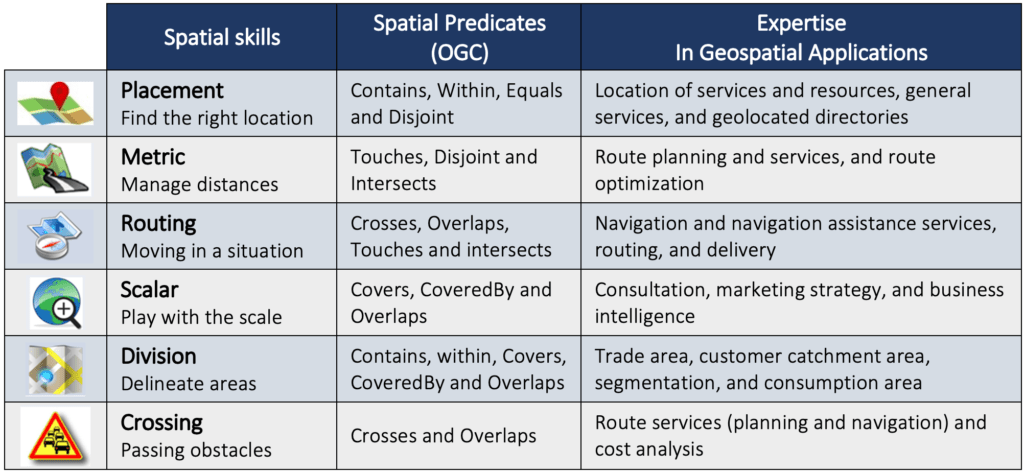Spatial Capital: A Little-Known Asset for Companies
March 16, 2022

Spatial Capital
According to the sociologist Pierre Bourdieu in Actes de la recherche en sciences sociales, (social science research) every company is endowed with economic, social, and cultural capital. Their coexistence and interactions allow us to understand and explain the place of a company in its socio-economic space. While economic capital refers to the total economic resources of a company, its income, and its assets, social capital refers more to “all current or potential resources that are linked to the possession of a sustainable network of more or less institutionalized relationships of mutual knowledge and awareness.” Cultural capital, in business, relates more to what Bourdieu describes as an institutionalized form, meaning expertise, and the level of training and diplomas of its members. Following this logic, geographer Jacques Lévy, in the Dictionnaire de la géographie et de l’espace des sociétés (dictionary of geography and social space), proposes another type of capital: spatial capital. This consists of all the resources developed by a company (data, knowledge, experience, skills, sense of place, etc.) which allow it to take advantage of the use of the spatial dimension of society, based on its own strategy and objectives.
The SARS-CoV-2 coronavirus pandemic will have disrupted several components: Mobility, consumption, work, and ways of socializing. It will have imposed on individuals, but also on businesses, to revisit, often in depth, their ways of doing business. It will also, for some, have been a force for innovation. Korem has not escaped this. These new realities have been used to rethink the organization of work, the organizational structure, as well as the places, the premises, their new destinations, and their roles. The metaphor of “reshuffling the cards” is not used by chance here, nor is it a whim of style. In a previous text, I referred to the importance of geospatial expertise in a post-COVID world, how these transformations had disrupted the relationships of individuals, organizations, and companies to the geographical space in general, particularly in their living spaces. This reshuffling of the cards is also — and above all — one of a geographical nature. A company’s spatial capital is the capital that allows it to reshuffle its cards.
It is quite obvious that businesses and retail businesses, as well as the food and beverage industry, have had to deal, often drastically, with sanitary constraints, travel limitations, successive confinements, and curfews. The example of the mandate carried out by Korem for St-Hubert Rotisseries Ltd a few weeks before the first confinement shows how geospatial expertise and specifically, addressing and optimizing delivery routes, enabled the company to cope with the significant increase in its online orders, while ensuring the quality of its delivery service. But all companies, all sectors combined, are facing new challenges in the management of spatial assets, resources (location and procurement), personnel (mobility, remote, and hybrid work), customers, and suppliers. Probably never in the past has the spatial capital of companies been developed and mobilized so much; making it work is a matter for specialists.
Yet many companies are underexploiting their spatial capital, depriving themselves of the competitive opportunity that it could represent. The reason is, most often, the lack of internal expertise and knowledge, but also the lack of a critical mass to develop internal expertise. In times of labor shortages, the stakes are even greater. This is the value provided by specialists such as Korem, which develops a core of multidisciplinary expertise around the management and enhancement of corporate, commercial or value-added data, and which offers its customers a range of support and consulting services aimed at increasing their spatial capital.
The Geospatial Expert: A Spatial Capital Advisor
For a company, taking advantage of its spatial dimension depending on its business sector, its sector of activity or its growth objectives, means having the ability to optimize the management of its spatial assets (its real estate and its optimal location), its resources (supply chains, logistics, and transport), its personnel (its mobility and working methods), its customers, and its suppliers. To do this, it takes data and tools, but also skills and a thought process and decision-making that do not reduce geographical space to a simple physical medium. This space should rather be considered as an integral dimension of the society and the market in which the company operates.

Spatial Skills and Geospatial Expertise (Source: Wikipedia)
The above table is the result of a small mapping exercise of the five elementary spatial skills described by geographer Michel Lussault in L’Homme spatial: (Spatial Man) La construction sociale de l’espace humain (The social construction of human space), elementary operators of spatial analysis (in this case, those of the Open Geospatial Consortium) and examples of the use of geospatial technology. He seeks to highlight how geospatial expertise provides the support needed to equip a company’s spatial capital.
The geospatial expert supports and acts as a strategic advisor to customers in the integration of geospatial technologies, and in decision-making and strategic processes. The advisor is able to mobilize a portfolio of data and software, recommend the best products in the industry, and participate in the integration of customized solutions that meet customers’ business needs. The geospatial expert, through his/her training, skills, and experience, is, in a way, to spatial capital what the financial advisor is to economic capital: a spatial capital advisor.




